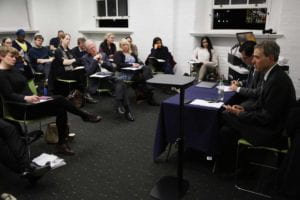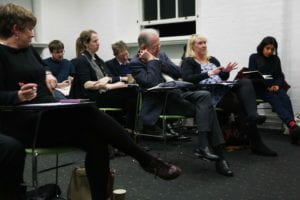Goldsmiths Law’s annual criminal justice lecture, delivered by Stanford Law School renowned academic, Prof David Sklansky, draws attention to US criminal law’s obsession with violent crime and mass incarceration, and sends a warning note to the UK.
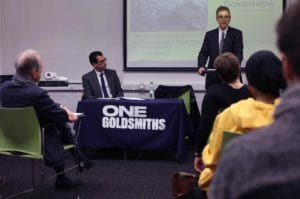
United States criminal justice policy took a calamitous wrong turn in the 90s. An oversimplified obsession with violent crime – typified by the ‘three strikes and you’re out’ laws and ideology – was the main engine of an unprecedented mass incarceration policy that had devastating consequences and ruined the lives of so many people in the country.
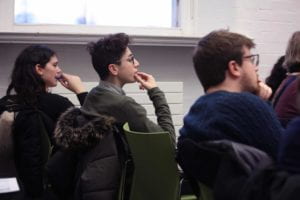
Students from other Goldsmiths departments among those attending the annual seminar. Goldsmiths Law concentrates heavily on interdisciplinary legal analysis.
This rise and rise of violent crime, as a gateway to mass incarceration of an unprecedented level in comparable legal systems, could not be understood outside the context of race.
Two of the central ideas that Stanford Law School’s Prof David Sklansky explored in his talk at Goldsmiths, on Tuesday, 26 March 2019, when delivering Goldsmiths Law’s inaugural annual criminal justice lecture.
Violence was given great significance in US substantive criminal law, he explained in more detail, though there did not seem to exist a rational basis – in the structure and grammar of criminal law – to distinguish violent from non-violent crime; rather criminal law’s fascination with, and emphasis on, violent crime had much to do with the fact that violent crime had been increasingly associated with black men, and with the impression that those committing violent crime were hardened incorrigible individuals.
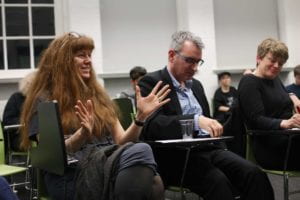
From left to right: Prof Jackie Hodgson, Richard Glover and Hannah Quirk
Violence had little salience in criminal procedure, on the other hand. Police violent misconduct was therefore not being challenged in courts; where it was, judicial challenges nearly always failed. And institutional challenges did not even exist. Police in the United States were killing two or three times more people than in any comparable country, and yet the United States were not even formally keeping track of the number of deaths.
Similarly, the increase in the use of “stop and frisk” (stop and search) in the 90s or the militarisation of US police at the same time received very little attention from criminal procedure.
The story of violent crimes in the US was in reality a story about how criminal law thinks about violence, the central question that Prof Sklansly sought to address in his lecture at Goldsmiths, and a question that is at the epicentre of his next book.
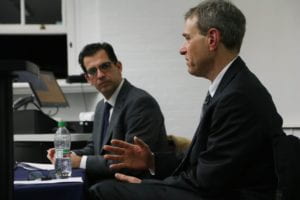 To reduce mass incarceration in the US, punishment for violent crime needed to be reduced, he argued. Criminal law should think more deeply, in other words, about whether there was indeed rational justification for the disproportionate emphasis on violent crime (and excessive punishment for those committing violent crime).
To reduce mass incarceration in the US, punishment for violent crime needed to be reduced, he argued. Criminal law should think more deeply, in other words, about whether there was indeed rational justification for the disproportionate emphasis on violent crime (and excessive punishment for those committing violent crime).
The story of US policy on violent crimes was above all a cautionary tale for the UK, highlighted Prof Sklansky. The UK Government’s Serious Violence Strategy, published in April 2018, showed that UK criminal law was thinking differently about violence than its American counterpart. It did not demonise people. UK criminal law was not obsessed with violence…
Prof Sklansky was aware that the Serious Violence Strategy had been criticised in the UK. But it could be seen much more positively when compared with the US, concluded the Stanford Law School academic, who is a former prosecutor and a world renowned authority on criminal law, criminal evidence and procedure.
Prof Sklansky was warmly welcomed to Goldsmiths by Head of Law, Prof Dimitrios Giannoulopoulos, who chaired the lecture.
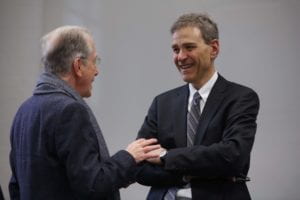
Prof David Sklansky (on the right) with Goldsmiths Law Visiting Professor, HH Judge Donald Cryan.
The lecture was marking the Law programme’s emphasis on criminal justice and international human rights, noted Prof Giannoulopoulos, and it was most fitting that it would be delivered by a distinguished scholar with such deep knowledge in, and passion for, both.
The sold out lecture was attended by many Goldsmiths students, and eminent criminal law scholars from across the UK and Europe, including Zurich’s Prof Sarah Summers, the University of Nottingham’s Prof John Jackson and Prof Paul Roberts, Wolverhampton’s Richard Glover, DCU’s Yvonne Daly, Warwick’s Prof Jacqueline Hodgson, King’s’ Hannah Quirk, and Visiting Professor in Law at Goldsmiths, HH Judge Donald Cryan.
The lecture was a highly stimulating prelude to the annual criminal justice symposium that took place the following day at the British Academy (a story on that will appear in this blog shortly).
For more information on Goldsmiths Law’s emphasis on social justice issues, and research excellence in criminal law, criminal justice and human rights see here.
